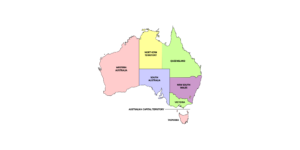Crimes That Cross State Borders: Where Will You Be Charged?

A person stands on one side of the New South Wales / Victoria border and discharges a firearm that fatally wounds a person on the other side.
Will the shooter be charged by New South Wales or Victoria Police? Which state’s laws will apply?
This scenario raises the question of criminal geographical jurisdiction, a complex area of law that occasionally arises in criminal prosecutions.
Here’s an outline of the rules.
What Is Jurisdiction?
In simple terms, ‘jurisdiction’ is about having legal authority to do certain actions or make certain decisions.
Jurisdiction could be about the power to exercise power over actions in a certain areas (geographical jurisdiction) or the power to exercise power about certain topics (subject matter jurisdiction).
We can further subdivide criminal geographical jurisdiction in three important ways:
- Police jurisdiction, which refers to the geographical locations in which different police agencies can enforce the law, as well as the kinds of laws they can enforce.
- Court jurisdiction, which refers to whether courts can hear certain disputes.
- Prosecutorial jurisdiction, which refers to whether particular Departments of Public Prosecutions can take on and prosecute a criminal case.
Police Jurisdiction
Police geographical jurisdiction is defined by agency control.
All state police agencies as well as the Northern Territory Police have jurisdiction for alleged breaches of state or territory criminal law, which occur within their state or territory (Eg. NSW Police would investigate and enforce the offence of theft of a motor vehicle under section 154F of the Crimes Act 1900 (NSW) for cars stolen in NSW).
In contrast, the Australian Federal Police and other federal enforcement agencies are the primary enforcement agency for alleged breaches of the Federal criminal law and have geographical jurisdiction nation-wide (Eg. Australian Federal Police would investigate and enforce the offence of importing a plastic explosive under section 72.13 of the Criminal Code Act 1995 (Cth) anywhere in Australia).
However, cross-border cooperation arrangements mean that these divisions aren’t so cut and dry in practice.
For example, it’s very common for NSW Police to investigate and charge someone for Federal offences, despite it technically being the jurisdiction of the Australian Federal Police. Similarly, NSW Police and Victoria Police will often cooperate in operations which cross state borders.
Unlike the very decentralised and uncoordinated police systems in the United States, there are rarely quibbles about police jurisdiction in Australia – with most agencies frequently collaborating in investigations and enforcement measures.
Court Jurisdiction
Court geographical jurisdiction is broad, with higher courts hearing all criminal matters that are validly charged and prosecuted in the state. For example, section 23 of the Supreme Court Act 1970 (NSW) states that the Supreme Court of NSW “shall have all jurisdiction which may be necessary for the administration of justice in New South Wales”.
Subject-matter jurisdiction is divided based on a hierarchy of the seriousness of criminal matters. For example, Local Court of NSW will hear minor criminal matters, the District Court of NSW will hear all criminal cases except for murder, treason and piracy and the Supreme Court of NSW will hear the most serious of criminal matters.
Prosecutorial Jurisdiction
Prosecutorial jurisdiction is defined by the type of criminal offence that has been alleged.
The Director of Public Prosecutions in each State and Territory is responsible for the prosecution of indictable (serious) State or Territory criminal laws. For example, the NSW DPP will prosecute NSW indictable offences in the NSW District Court of Supreme Court of NSW.
In contrast, the Commonwealth Department of Public Prosecutions is responsible for the prosecution of offences against Commonwealth law, as well as the criminal laws of Jervis Bay, Norfolk Island and Australia’s external territories.
The Test of “Geographical Nexus”
The cross-border shooting scenario provided in the introduction raises a key question about jurisdiction, as the fatal shooting could result in a charge and prosecution in either:
- NSW for the offence of murder under both the section 18 of the Crimes Act 1900 (NSW); or
- Victoria for the offence of murder under as section 3 of the Crimes Act 1958 (VIC).
When there is a question of which state or territory criminal law applies, the relevant legislation tells us to look for a sufficient “geographical nexus” to the alleged criminal conduct.
Section 10C of the Crimes Act 1900 (NSW) makes it clear that if all elements necessary to constitute an offence against a law in NSW exist and a geographical nexus exists between the State and the offence, the offence can be charged and prosecuted in NSW.
The section goes on to outlines that a “geographical nexus” exists if:
- The offence is committed wholly or partly in the State (whether or not the offence has any effect in the State); or
- The offence is committed wholly outside the State, but the offence has an effect in the State.
In the cross border shooting scenario, as the elements of murder require a person to be “unlawfully killed by another”, the offence will be committed “wholly or partly” in NSW, if the person was killed in NSW. If the person was killed in Victoria, the person would only be able to be charged and prosecuted in NSW if “the offence has an effect in the State”.
The geographic scope of Federal criminal laws is even broader.
Section the 3A of the Crimes Act 1914 (Cth), notes that the legislation applies to crime which have been committed or have “a result” within the geographical borders of Australia.
The Criminal Code Act 1995 (Cth) goes further still, including some offences which apply to conduct outside of Australia including where a person is an Australian citizen or resident, or have where they committed the offence in preparation or furtherance of a crime within Australia (see sections 15.1 – 15.4).
If your upcoming criminal case involves a question of geographic jurisdiction it’s important that you get a lawyer knowledgable about this complex topic, call Sydney Criminal Lawyers anytime on (02) 9261 8881 to arrange a free first consultation with a specialist criminal defence lawyer who and has a proven track record of producing exceptional outcomes.






